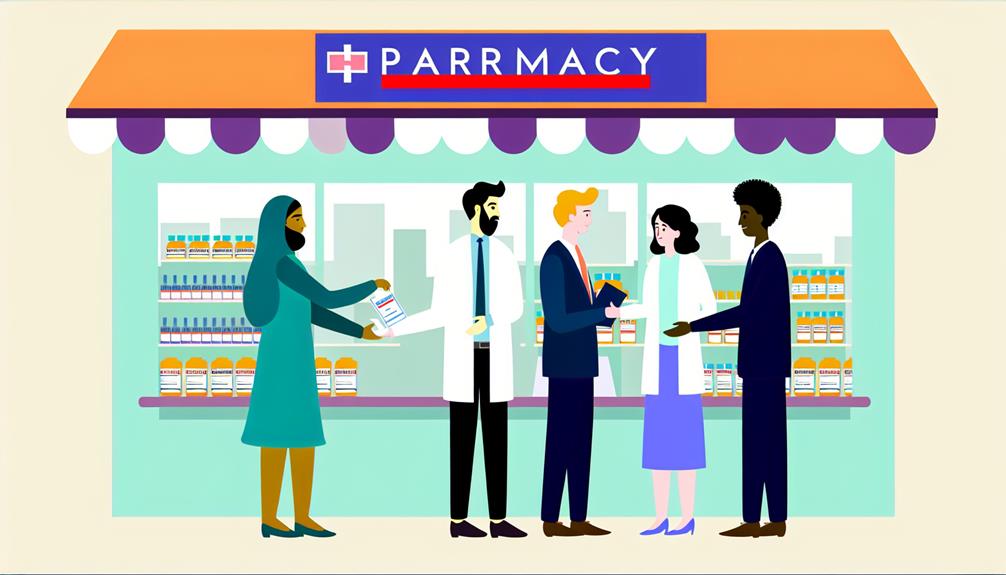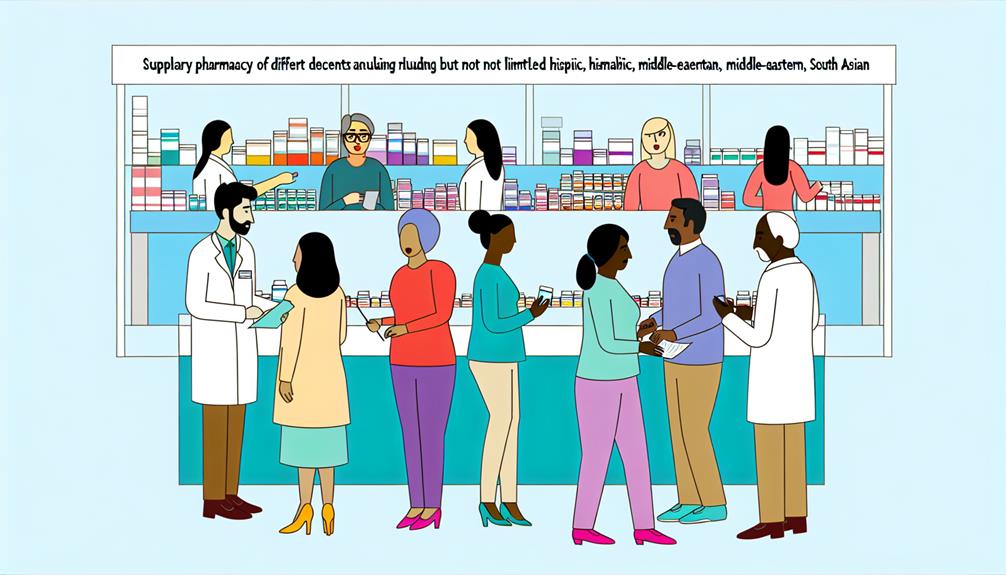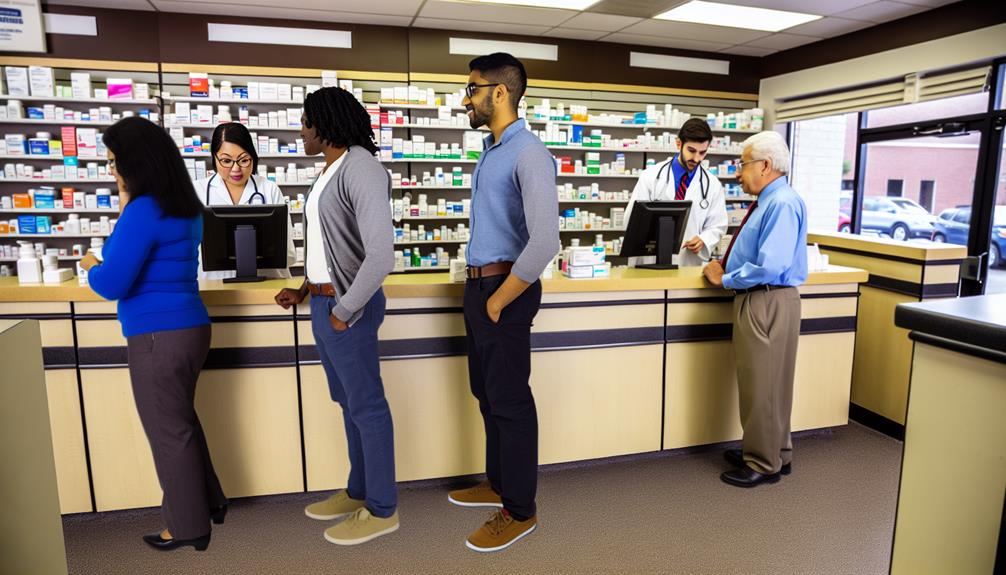Pharmacies in Houston are more than just places to grab your meds. They're like healthcare hubs, offering a whole range of services beyond just giving out prescriptions. The impact they have on promoting wellness and supporting community health is huge.
Thinking about pharmacies in Houston, it's clear they play a vital role in taking care of people's health in a well-rounded way. From my own experience, pharmacies in Houston are not just about getting medicines but also about fostering a sense of well-being and community health.
The personalized care and attention you receive there truly make a difference in how you feel and how you manage your health. It's like a one-stop-shop for all your health needs, and the support they provide goes a long way in keeping you healthy and happy.
Importance of Pharmacies in Healthcare Access
Pharmacies in Houston are like neighborhood health hubs, offering a wide range of vital services beyond just giving out prescriptions to help improve the well-being of residents. These pharmacies do more than just hand out medications; they also provide preventive care and diagnostic tools, playing a key role in boosting community health in Houston. Pharmacists in Houston play a crucial role in enhancing medication adherence, safety, and overall health outcomes for locals. Research shows that pharmacy interventions in Houston result in better medication adherence rates and fewer hospital admissions, underscoring the significant impact these healthcare providers have on the community's health.
Having access to pharmacies in Houston is crucial for managing chronic conditions and ensuring residents use their medications correctly. By offering a variety of services that aid in disease prevention, cut down healthcare expenses, and promote community well-being, pharmacies in Houston significantly contribute to enhancing overall health outcomes and quality of life for individuals in the region.
Accessibility Challenges Faced by Houstonians
In Houston, getting essential pharmacy services can be a real challenge, especially for Hispanic and Black residents who are disproportionately affected by pharmacy deserts. These areas lack nearby pharmacies, making it tough for people to access their medications easily.
This issue isn't unique to Houston – around 15 million Americans live in similar pharmacy deserts in urban neighborhoods, leading to difficulties in sticking to prescribed medications. When pharmacies are far away, people are less likely to refill their prescriptions on time, which can result in poor health outcomes and higher medical costs, especially in communities with limited resources.
Having pharmacies close by is crucial for people to stay on top of their medications and improve their overall health. Initiatives like Capsule expanding in Houston are working to address these disparities by making pharmacy services more accessible and bridging the gap in medication availability within the community.
Role of Pharmacies in Addressing Health Disparities

When we talk about healthcare gaps in Houston, it's clear that pharmacies are crucial in addressing these issues. The closure of pharmacies in Houston hits underserved communities the hardest, making existing health disparities even worse.
Pharmacy deserts, where access to pharmacies is limited due to closures, transportation challenges, financial constraints, and cultural differences, widen the healthcare access divide. In Houston, racial and ethnic inequalities also play a role in unequal pharmacy access, particularly affecting black and Hispanic neighborhoods with more pharmacy deserts. Segregated areas, especially black communities, struggle with fewer pharmacies and longer trips to get necessary medications.
To tackle these disparities, it's vital for policymakers, healthcare providers, and community members to work together on solutions. By collaborating to tackle the root causes of limited pharmacy access, Houston can make strides towards ensuring fair pharmacy services for everyone. Prioritizing these joint efforts is key to closing the healthcare gap and promoting health equity in the city.
Innovations in Pharmacy Services in Houston
In the realm of healthcare access challenges in Houston, the pharmacy landscape is evolving to prioritize innovation and patient well-being. One notable addition to the scene is Capsule, a digital pharmacy stepping into Houston to address pharmacy deserts by offering free same-day prescription delivery. Their tech-savvy approach, featuring smart refills to prevent missed doses and direct pharmacist interactions, elevates the overall customer experience.
With close to 15 million Americans living in pharmacy deserts, initiatives like Capsule are crucial in tackling this issue head-on.
Houston, with its distinct challenges in pharmacy access that disproportionately affect Hispanic and Black communities, urgently requires expanded pharmacy services. Capsule's expansion in Houston is strategically geared towards combating medication non-adherence and improving access, especially in underserved areas. By harnessing digital innovations and providing personalized care, Capsule is actively narrowing the healthcare gap in Houston, highlighting the significance of cutting-edge pharmacy services in underserved neighborhoods.
Community Impact of Pharmacies in Houston

Pharmacies in Houston are lifelines for the community's health, offering a range of services and initiatives to improve access and promote public well-being.
The vast majority of Texas community pharmacies, over 90%, actively participate in essential healthcare programs, bolstering healthcare accessibility in Houston. Around 58% of Houston pharmacies provide delivery services, making it easier for patients to access their medications conveniently.
Moreover, these pharmacies play a crucial role in administering immunizations, with an impressive 78% vaccination rate, significantly contributing to public health efforts and disease prevention. Some pharmacies in Houston even offer in-store infusion services, catering to specific healthcare needs within the community.
Notably, during the challenging times of the COVID-19 pandemic, Houston pharmacies took the lead in administering the majority of immunizations, highlighting their pivotal role in public health endeavors.
Frequently Asked Questions
Why Is Pharmacy Important in Healthcare?
Pharmacies play a vital role in healthcare by providing essential medications, preventive care, and diagnostic supplies. Pharmacists are key players in ensuring medication adherence, safety, and positive health outcomes through their knowledge and interventions, ultimately benefiting the overall well-being of the community. Their expertise not only helps individuals manage their health effectively but also contributes to the broader public health landscape.
Why Is Pharmacy Important in Hospitals?
Pharmacies play a vital role in hospitals by quickly providing medications, ensuring safe treatment, and working closely with healthcare teams. They handle inventory, follow strict regulations, and focus on preventing errors to safeguard patient well-being. It's all about delivering care efficiently and accurately to those who need it most.
What Is the Importance of Pharmacy in the Community?
Pharmacies play a vital role in our communities by helping people stick to their medications and stay healthy. They offer services like check-ups and tools for diagnosing illnesses, which can boost adherence to treatment plans and lower the need for hospital visits, especially for those managing long-term health issues.
How Important Are Pharmacies?
Pharmacies play a crucial role in maintaining your well-being. They offer more than just prescriptions; they provide essential services for your health. In Houston, pharmacists play a key role in boosting medication adherence and ensuring safety, which can help reduce hospital visits. Having easy access to pharmacies is vital for managing chronic conditions effectively, promoting overall public health, and saving on healthcare costs. So, next time you visit your local pharmacy, remember that it's not just about picking up meds—it's about taking a step towards better health.
